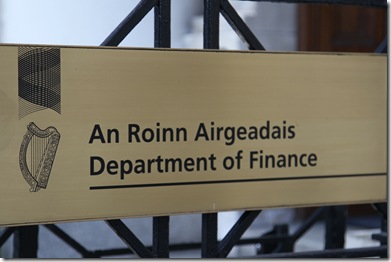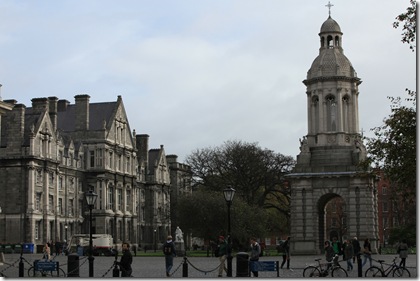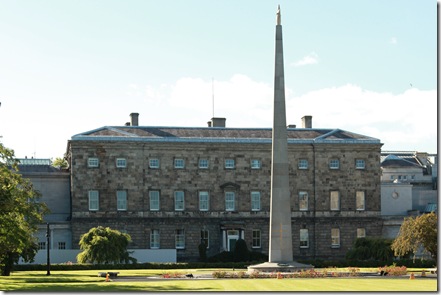 The stakes for Ireland have never been higher. Generations of Irish people are extremely vulnerable after the catastrophic and systemic collapse in September 2008 of the financial system, the Central Bank and the Department of Finance - in its role of global overseer and talent scout.
The stakes for Ireland have never been higher. Generations of Irish people are extremely vulnerable after the catastrophic and systemic collapse in September 2008 of the financial system, the Central Bank and the Department of Finance - in its role of global overseer and talent scout.
Citizens would expect that the membership of the newly inaugurated Central Bank Commission would comprise outstanding and distinguished individuals whose authentic stature and relevant experience would be an asset to the Governor and Financial Regulator. They would also be expected to act as a countervailing influence to them on the basis of knowledge, insight and most importantly, credibility. This is, after all, Ireland in reform mode and the Department of Finance demonstrating how it can pull an A-team together.
The last board of the Central Bank included a menagerie of well-meaning grandees, retirees and all sorts of extremely important, loquacious people. But they were no match for the quartet of delusionary muppets that disported themselves as the Board of Irish Nationwide Building Society.
They facilitated Michael Fingleton to obtain remuneration of €16 million from 1 January 2003 until he left Irish Nationwide (with ‘holiday pay’ of €450,000, to compensate his untaken leave), the gouging by him, in 2007, of a pension fund of €28 million leaving a residual fund of €4 million (in deficit) to cover the remaining 400 employees and, of course, his €1 million bonus that Fingleton gouged when his wretched building society was utterly insolvent.
Why did the Department of Finance choose Des Geraghty and Michael Soden to be members of the first Commission?
DES GERAGHTY
Des Geraghty (67) retired as President of SIPTU in 2003 and was subsequently a member of the board of the FÁS, the Cradle of Corporate Governance.
That board was stood down in disgrace this year when an investigation by the Comptroller & Auditor General revealed outrageous breaches of corporate governance resulting in large losses to the State. There have also been allegations of fraud on the part of third-parties employed to conduct training on behalf of the agency. Trainees have been unable to obtain certification for courses they believed they satisfactorily completed and an EU audit has delayed payment of funds from that source. There are therefore most serious questions about corporate governance and trust at that agency. The Public Accounts Committee have yet to issue findings on their investigation of FÁS.
It is not at all clear if Geraghty has any related education, qualifications, experience, insights or understanding of the financial industry that would commend him to serve on the board of the Central Bank Commission. His passion is poetry and he has published a couple of books.
What particular reform qualities will Geraghty be bringing in his kit bag from Baggot Street? How about credibility with the EU Commission, business process expertise and know-how, a skill in analysing budgets and overseeing subsequent expenditure? Perhaps he qualifies as the centurion guard of corporate reputation and the ‘men-in-red-braces’ who determine credit ratings, interest rates on sovereign debt, credit availability, bond spreads will be suitably impressed, despite their coldness from time to time. Those who expected to receive certificates of accomplishment for training from FÁS could be skittish about his capacity to represent the interest of the consumer in his new role.
Mr Geraghty, of course, would also have an unambiguous measure of the Department of Finance following the negotiation of the Rody Molloy ‘kiss-and-goodbye’ package (+car) and he will have observed how Pat Neary has been saved from distressing penury while the population at large are about to be pistol-whipped in the next Budget to fund his exit from College Green.
MICHAEL SODEN
Michael Soden seems to like the sound of his own voice and the megaphone he uses to bellow at café society.
An exponent of the ‘Why Not? Academy of Lateral Thinkers’ he suggested three days after his appointment to the Commission that if everyone in Ireland worked a 5½-day week there would be a 10% linear improvement in national productivity.
His most recent rambling was ‘Let’s quit the EU and join the US’ thus demonstrating his capacity to prostitute our national sovereignty.
The Department of Finance have now given him a pulpit and a mandate from which to bellow through his megaphone and entertain the high-polloi of the EU, the European Central Bank, the IMF, the rating agencies and the men-in-red-braces. Perhaps if a capacity to entertain was the criteria of the Department of Finance based their choice of candidate on, it is strange that they overlooked personalities such as Twink, Sinead O’Connor, Bob Geldof and Fr Brian D’Arcy as potential members of the Central Bank Commission. Given infinite reach of Soden’s wisdom perhaps Jay Leno could have enriched the Soden’s rose-tined and starry-eyed US perspective. What can Soden offer that they could not? They are all entertainers!
National Australia Bank
Soden was one the top-13 executives at National Australia Bank (The National) from 1994 to 2000. He reported to Donald Argus, Chief Executive and Managing Director from 1989 to 1999 and to Frank Cicutto who succeeded Argus in 1999. Argus was a director of National Irish Bank (NIB) and National Irish Bank Financial Services from the time it became a wholly owned subsidiary of The National in 1987.
The High Court appointed Inspectors to investigate NIB in March 1998. This took six years to complete and covered a series of major transgressions of company law from 1988 until 1998. NIB was severely criticised in the Final Report of the Inspectors on the basis of findings of the utmost gravity, involving well in excess of a dozen persons, that were the consequence of a catastrophic lapse in the standards that customers and third parties dealing with any bank are entitled to expect.
The catalyst for the appointment of Inspectors was not the policing and enforcement competence of the Central Bank during the tenure of two Governors, the late Mr Doyle and Mr O’Connell. The incompetence of the Central Bank to police the Irish banks was exposed by the curiosity of two investigative reporters from RTE.
RTE reported in March 1998 that interest charges had been increased, without legitimate reason, and without customer knowledge in four branches. They also reported that customer fees had been uplifted in one branch in November 1989 without customer knowledge, or underlying justification. They stated that these practices were systematic within NIB and were motivated by a desire for enhanced profitability and career progression. It was these characteristics and values that attracted the vicarious patronage of Argus. It was these RTE reports which prompted High Court intervention less than a week later.
The matters investigated involved large sums of money and demonstrated a lack of commercial probity that cost NIB €64 million. The inspectors’ findings included:
- The opening and maintenance of bogus non-resident accounts in NIB branches enabling customers to evade tax through concealment of funds from the Revenue Commissioners
- Fictitiously named accounts opened and maintained that enabled customers to evade tax
- CMI policies were produced as a secure investment for funds undisclosed to the Revenue Commissioners
- Special Savings Accounts had DIRT deducted at the reduced rate, notwithstanding that the applicable statutory conditions were not observed – a curtain raiser to the establishment of the DIRT Inquiry by the Public Accounts Committee in 1999.
- There was improper charging of fees to customers
- There was improper charging of interest to customers
At no time prior to the appointment of the Inspectors did NIB address the issue of a potential retrospective liability to the Revenue Commissioners for tax arising from the irregularities in the operation of DIRT.
NIB, under the direction of its executive leadership in Australia, had therefore debased several major institutions of this State, including the Central Bank and the Revenue Commissioners and ruined the reputation of Ireland as a trusted, respected component of the global financial sector. What was discovered made Nigeria scam merchants’ seem virtuous, noble, respectable and trustworthy.
The response of The National to the appointment of Inspectors by the High Court was: “During the year (1998) NIB was the subject of investigations arising from allegations against certain parts of its operations. While involving unfavourable publicity, none of these investigations demonstrated widespread, or systematic, misconduct and the Bank will continue to work constructively with the authorities in order to resolve these matters” (The National 1998 Annual Report). These are the views of the executive leadership The National that included Soden at that time.
Major breaches of the Companies Acts seemed to have had as much impact on Mr Argus and his leadership team as an intermittent episode of trapped wind, corporate heartburn and halitosis. There was no evidence of Matthew Elderfield’s vision of intrusive supervision between 1988 and 1998 in the relationship between The National and its own wholly-owned subsidiary in Ireland.
When the Inspectors’ Report was published in 2004, after Soden left Bank of Ireland, The National issued its second press release on the subject of the NIB investigation. It stated that “the Director of Corporate Enforcement in Ireland today (30 July) released the Report of the High Court Inspectors into certain past business activities of NIB. The events go back a long time” - an antiseptic response to what transpired to be a plague of rapidly deteriorating bad behaviour as Irish banks engaged in ‘follow-the-leader’.
The Director of Corporate Enforcement was subsequently to begin a process to seek the disqualification of nine senior managers of NIB. Disqualification prevents the person concerned from acting as an auditor, director, or other officer, receiver, liquidator or examiner – or be in any other way, whether directly, or indirectly, concerned, or take part, in the promotion, formation or management of any company or society registered under the Industrial and Provident Societies Act 1893 to 1978.
Mr Justice Peter Kelly stated on 26 October 2005 with respect to NIB “the edifice of banking is built on a foundation of trust. On the Inspectors findings there was a breach of trust by dishonesty. The operations were carried out over a period of years in a deliberate fashion on the part of the Bank”.
Bank of Ireland
Soden was employed by Bank of Ireland from 1 September 2001 until 29 May 2004, a period of 1,001 days, for which he received remuneration of €4.79 million. He joined the Court on 11 September 2001 and became Group Chief Executive on 1 March 2002. Soden held this position until he abruptly left the employment of Bank of Ireland on 29 May 2004.
Soden’s career at bank of Ireland was generously described by Laurence Crowley, the Governor, on 29 May 2004, as “having made an enormous contribution” and having placed the Bank of Ireland “in a position of solid strength for future growth”.
During the 820 days that he was Group Chief Executive, 61% of total Bank of Ireland loans were in respect of residential mortgages, property, construction and commercial mortgages. How comfortably does this fit with Matthew Elderfield’s views on lending standards? Soden is also an example of the over-remunerated asset acquirer – who vigorously pursued Abbey National, the former UK building society, in 2002, until he was shunned.
Lending growth by Bank of Ireland to the Irish residential mortgage sector, under Soden, was achieved through increasing lending, from 12% to 20% of total loans to new Irish borrowers, in respect of properties with a loan-to-value ratio of between 91-95%. Lending to new Irish borrowers in respect of properties with a loan-to-value ratio of 75%, or less, concurrently reduced from 53% to 45% of total loans to that category. Mortgages were also extended to British customers towards properties with a loan-to-value ratio in excess of 95%. How does this practice connect to Matthew Elderfield’s views on risk management arrangements?
It clearly had catastrophic risk implications because the Irish taxpayer was forced to provide €3.5 billion to supplement its capital and NAMA will be taking over €12 billion in loans at a discount of 42%.
When describing the impact of his leadership at Bank of Ireland Soden stated that “this very consistent performance is the result of focused management attention to the needs of our customers and clear strategies for growth. The achievement of our strategic goals is also supported by an excellent credit culture, a commitment to the highest standard of corporate governance and behaviour”. (Group Chief Executives Operating and Financial Review - Annual Report 2003).
But it was his own hypocrisy that hastened Soden’s departure and the ‘embarrassment’ that he caused his counterparts on the Court of Bank of Ireland, - prominent individuals such as Denis O’Brien, Ray MacSharry, Maurice Keane and Richard Burrows among them. Is it realistic that Soden, as a member of the Central Bank Commission would be overseeing the effectiveness of the board member at Bank of Ireland who was a contemporary of his in 2004 when he ‘embarrassed’ his colleagues?
Embarrassment at Bank of Ireland, comes with a hefty price tag, which in this instance was €96 million, as reflected in the drop in share price from the 20 to 29 May 2004, when Mr Soden’s foibles with adult content on the internet during business hours came to light.
PERCEPTION OF CENTRAL BANK COMMISSION
Perception counts for much in the assessment of credibility the calibration of credit rating, bond spreads and sovereign interest rates. What credibility will this Commission have? Why must it be necessary to waste time explaining its make-up?
Credibility made it possible for William Howard Taft to become the 10th Chief Justice of the United States Supreme Court eight years after he left the White House in 1913 and it was not possible for Richard Nixon to emulate him 60 years later. That would also explain why senior members of the Christian Brothers order do not appear in the leadership ranks of rape crisis centres’ located in major metropolitan locations.
Irish people deserve better from their Government and their Department of Finance. Thoughtful consideration of what is really in the national interest is like MasterCard – priceless.














